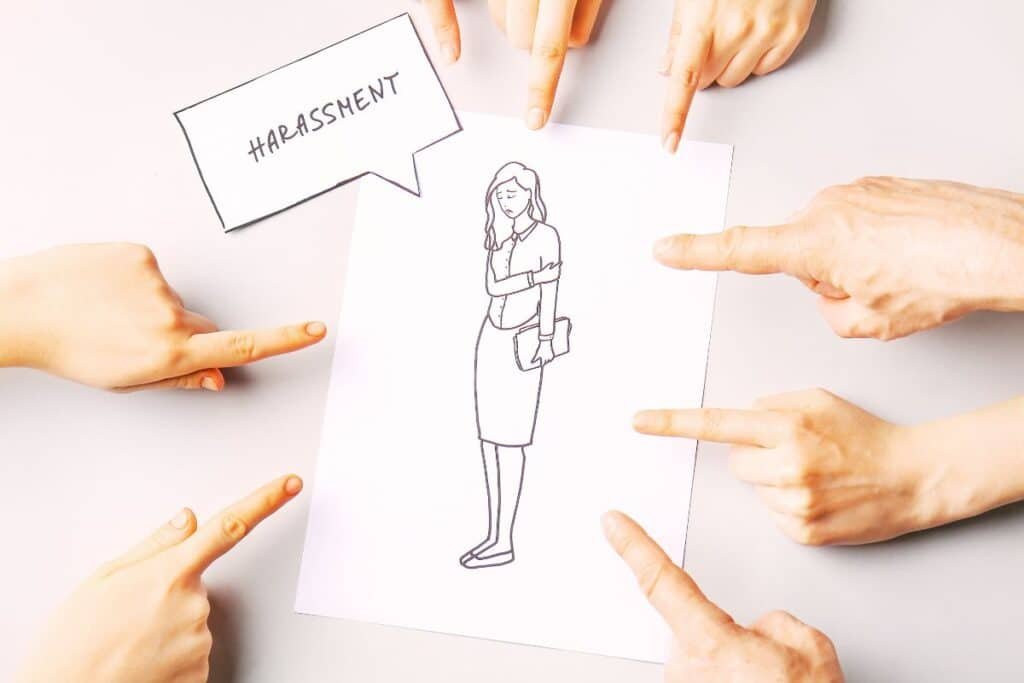You’ve heard them. Maybe at work. Maybe at the dinner table. Maybe from a total stranger in the street.
If you’re a women, you’ll have heard them more than the men in your life.
And they’ve likely shaped how you act and dress, even if you’d hate to admit that.
Misogynistic and sexist comments are everywhere. They are often passed off as jokes, harmless banter, or “just being honest.”
But let’s be clear: misogyny is not harmless. These types of comments are rooted in centuries of sexism, and whether they are made subtly or bluntly, they reinforce the idea that women should be quieter, smaller, less ambitious, or simply less.
And that is not ok.
And the worst part of it all is that as women, we’re often expected to smile and brush it all off. If we fight back; we’re argumentative and bossy; words that don’t seem to be used for our male counterparts in the same way.
In this post, we will break down what misogyny is, how it’s deeply rooted into our everyday language, and share 24 real-life examples of misogynistic comments women hear all the time.
Use this list to spot it, call it out, and, if you choose, to shut it down.
Because staying silent shouldn’t be the default.
What Is Misogyny?
Misogyny is more than just a dislike or prejudice against women. It’s a deep-rooted belief system that devalues, silences, or controls women and girls.
Often, misogyny is subtle and seemingly inoffensive. Other times, misogyny is in-your-face and aggressively women-hating garbage. Think Andrew Tate and Donald Trump at this point.
Misogyny feeds into gender inequality, perpetuates violence against women, and keeps harmful power structures in place.
Unfortunately, misogyny is so deeply ingrained in our society that we barely even notice it half of the time. As I said in the introduction, a lot of misogynistic comments are passed off as “banter.”
But “banter” isn’t an excuse for saying things that put down half of the world’s population. And “banter” isn’t ok when it feeds into victim blaming culture.
And yes, I’ve used some of these phrases myself before. And sometimes I still catch myself when I go to make a comment. But no one’s perfect and we’re all still learning. But that’s the point of this post, to make us stop, think, and have the confidence to call out behaviours that are not acceptable before they escalate to anything else.
What’s the Problem with Misogynistic Comments?
The problem with misogynistic comments is that they are used to undermine, even subtly or unintentionally, women and girls.
Generally speaking, these types of remarks will:
- Dismiss women’s opinions or expertise
- Blame women for men’s behavior
- Sexualise or objectify women
- Act as a way to women’s bodies, clothes, or choices
- Suggest women are less capable, emotional, or manipulative by nature
And this is just not ok. It was was, but in 2025, we now have more of a responsibility than ever to take note of these comments and call out the people making them.
Yes, calling out these comments is hard. And this is mainly because it’s so easy to turn around to the person calling out the commentor and call them “sensitive,” a “fun-sucker,” or someone who “can’t take a joke.”
25 Examples of Sexist Comments
| Sexist Comment | Possible Responses |
|---|---|
| You’d be prettier if you smiled more. | And you’d be less creepy if you stopped commenting on women’s faces. I smile when I feel like it, not on command. |
| Are you on your period or something?/ Are the painters in? / Is it that time of the month? | Nope, just reacting to nonsense like anyone else would Do you always blame hormones when women express opinions? |
| She slept her way to the top. | Ah yes, the classic excuse when a woman succeeds, try again. Interesting how her hard work gets erased by gossip, but men don’t get the same treatment. |
| Women just aren’t as logical as men. | Logic isn’t gendered. But thanks for revealing your bias. Is that your logic talking, or your insecurity? |
| I’d never take orders from a woman. | Then you’re going to struggle in any modern workplace. That says more about your ego than about female leadership. |
| You should take it as a compliment. | Unwanted comments about my appearance aren’t compliments. A real compliment doesn’t come with discomfort. |
| She’s too emotional to be a good leader. | Funny, research shows emotional intelligence makes better leaders. So, showing empathy and humanity is a flaw now? |
| You don’t want kids? You’ll regret that one day. | Not everyone’s life goal is motherhood, and that’s okay. Thanks for your unsolicited prophecy, but I’ll make my own decisions. |
| Girls aren’t good at maths or science. | That’s not a fact. That’s conditioning and low expectations talking. Tell that to the women who helped land us on the moon. |
| You’re just saying that because you’re a feminist. | Yes, because I believe in equality. Why does that bother you? You say that like it’s a bad thing. |
| She must be a nightmare to date. | Standing up for herself doesn’t make her a nightmare, just someone with boundaries. You mean she doesn’t tolerate poor treatment She sounds like a catch. |
| Stop being so dramatic. | Calling me dramatic doesn’t make your point any more valid. Labelling women’s emotions as drama is how people avoid accountability. |
| You got that promotion because they needed to hit a diversity quota. | No, I got it because I earned it, unlike people who feel threatened by it. It’s wild how threatened some people are by a woman’s success. |
| She’s probably lying about the harassment for attention. | Do you know how rare false accusations are compared to actual harassment? Why is your first instinct to protect the abuser and not the victim? |
| Women are just naturally manipulative. | Or maybe you just don’t like it when women assert themselves. That’s a convenient excuse for ignoring women’s boundaries. |
| You’re too bossy. | When men lead, they’re confident. When women do it, we’re bossy That’s not leadership, it’s bias. I’m assertive. If that feels threatening, that’s your issue. |
| You should dress more modestly if you don’t want attention. | What I wear doesn’t give anyone permission to disrespect me. The problem isn’t my clothes, it’s your mindset. |
| You’re pretty smart…for a woman. | You were almost respectful. Try again without the sexism. And you’re surprisingly outdated for 2025. |
| No wonder you’re single. | Better to be single than with someone who says things like that. Being single isn’t a punishment; it’s peace. |
| He wouldn’t have done that if you didn’t lead him on. | Responsibility lies with the person who crossed the line. Always. Consent isn’t confusing, people just ignore it. |
| That’s not very ladylike. | Good. Being ladylike is just code for being quiet and agreeable. I wasn’t trying to fit your outdated definition of femininity. |
| You’ve got a resting bitch face. | My face isn’t here to entertain you. If I had a pound for every time I heard that, I’d fund a course on respecting women. |
| You should cover up, you’ll distract the boys. | Maybe teach the boys not to objectify women instead. I’m not responsible for someone else’s lack of self-control. |
| Go make me a sandwich. | Sure, right after you crawl out of 1950. Make your own. It’s 2025, not a sitcom. |
| I’ll sort it out for you. (Said in reference to something to do with tech or IT). | That’s kind of you, but I know what I’m doing. You’d be surprised how many women are good with tech. Appreciate the offer, but I’m perfectly capable of doing it myself. |
Ok, so some of these responses are a little tongue in cheek; and I’ll be honest in saying that ChatGPT helped me conjour up some of the responses.
But the fact remains that these comments are not ok and you should feel empowered to call people out for making them, if you feel able.
The problem with comments like this is that every single one of them sends a message that women are less than their male counterparts. When left unchallenged, these phrases and remarks reinforce harmful norms and can go a long way to breaking down someone’s confidence and credibility.
Final Thoughts
Misogynist comments and phrases that are used to dismiss and diminish women are not ok. It doesn’t matter if they are offhand remarks, so-called jokes, or “friendly banter.”
But every time we let a comment such as these slide, what we’re doing is making the person making these comments think that it’s ok. That it’s ok to diminish someone based on their gender.
And it’s not.
It never was ok, but it especially isn’t ok today.
And I get it, no one is perfect. I find myself using misogynistic comments every so often to. But I’m learning and I’m being careful to make a conscious effort with the language that I use, especially when speaking to my daughters.
Calling out misogyny helps people to think about the language that they use and how they use it. Whether you call people out by shutting them down or by using a witty (or not so witty) comeback, you’re making someone think. And remember, if they are upset by you calling them out, that’s their problem, not yours.



